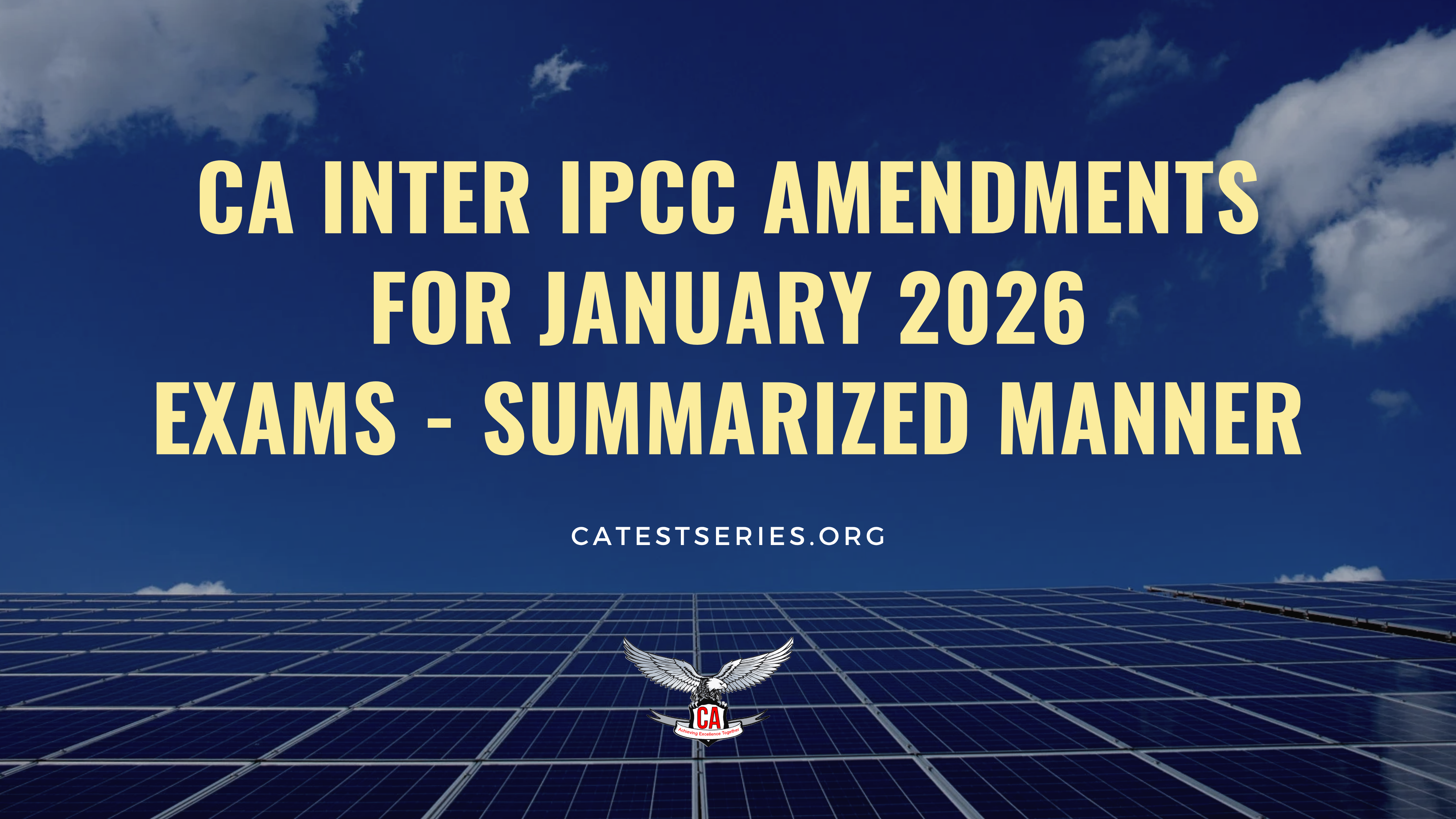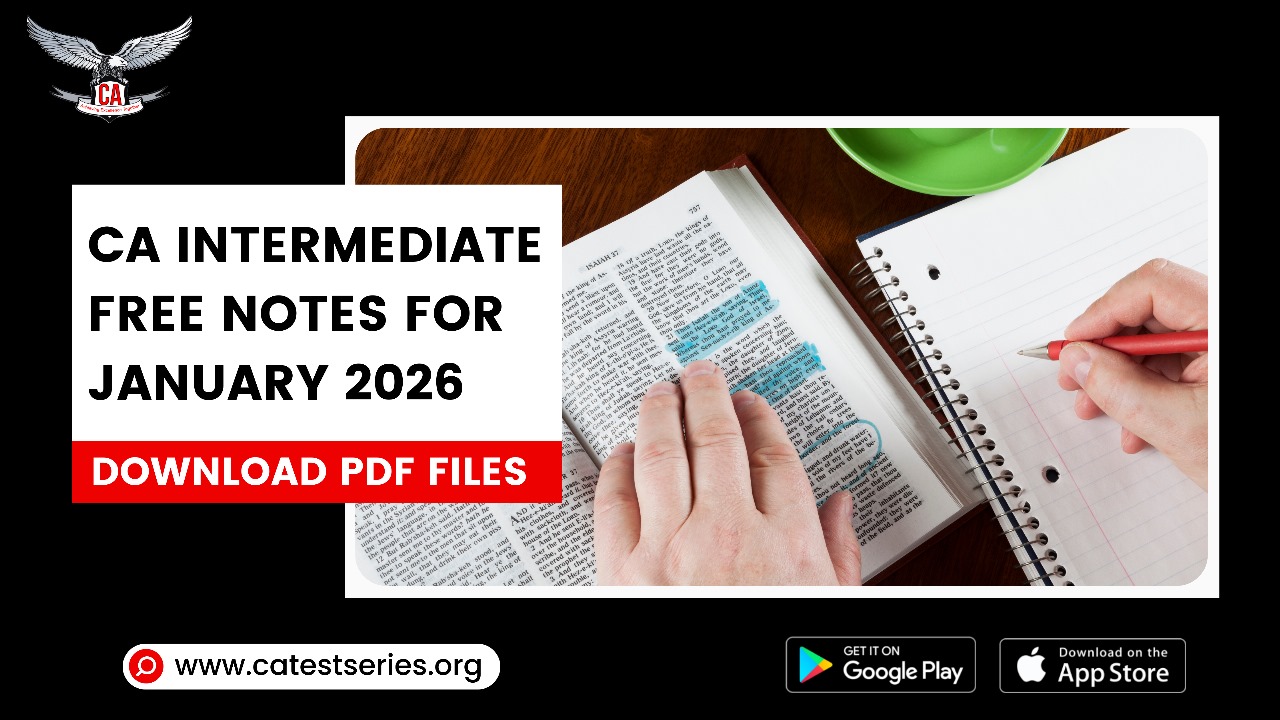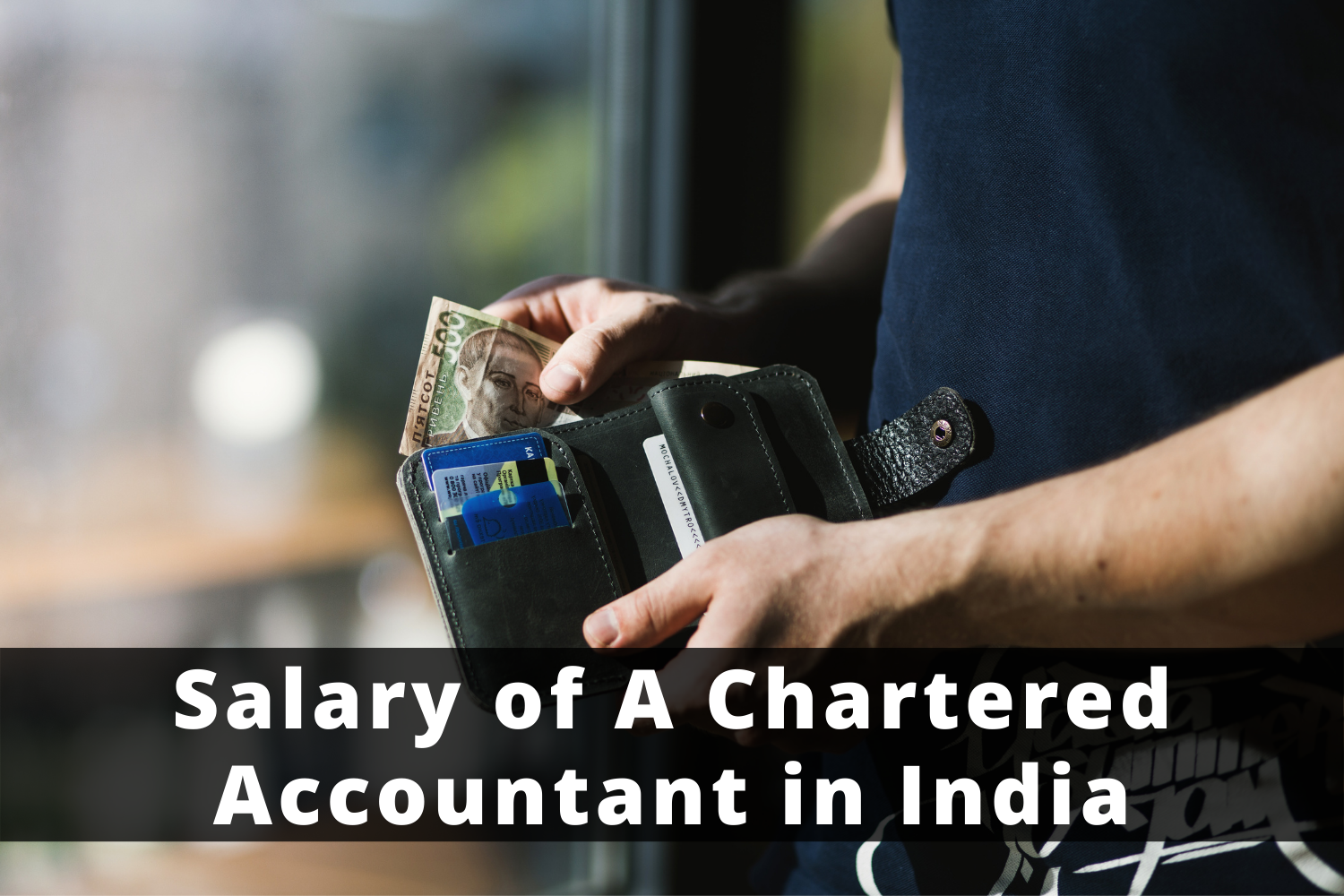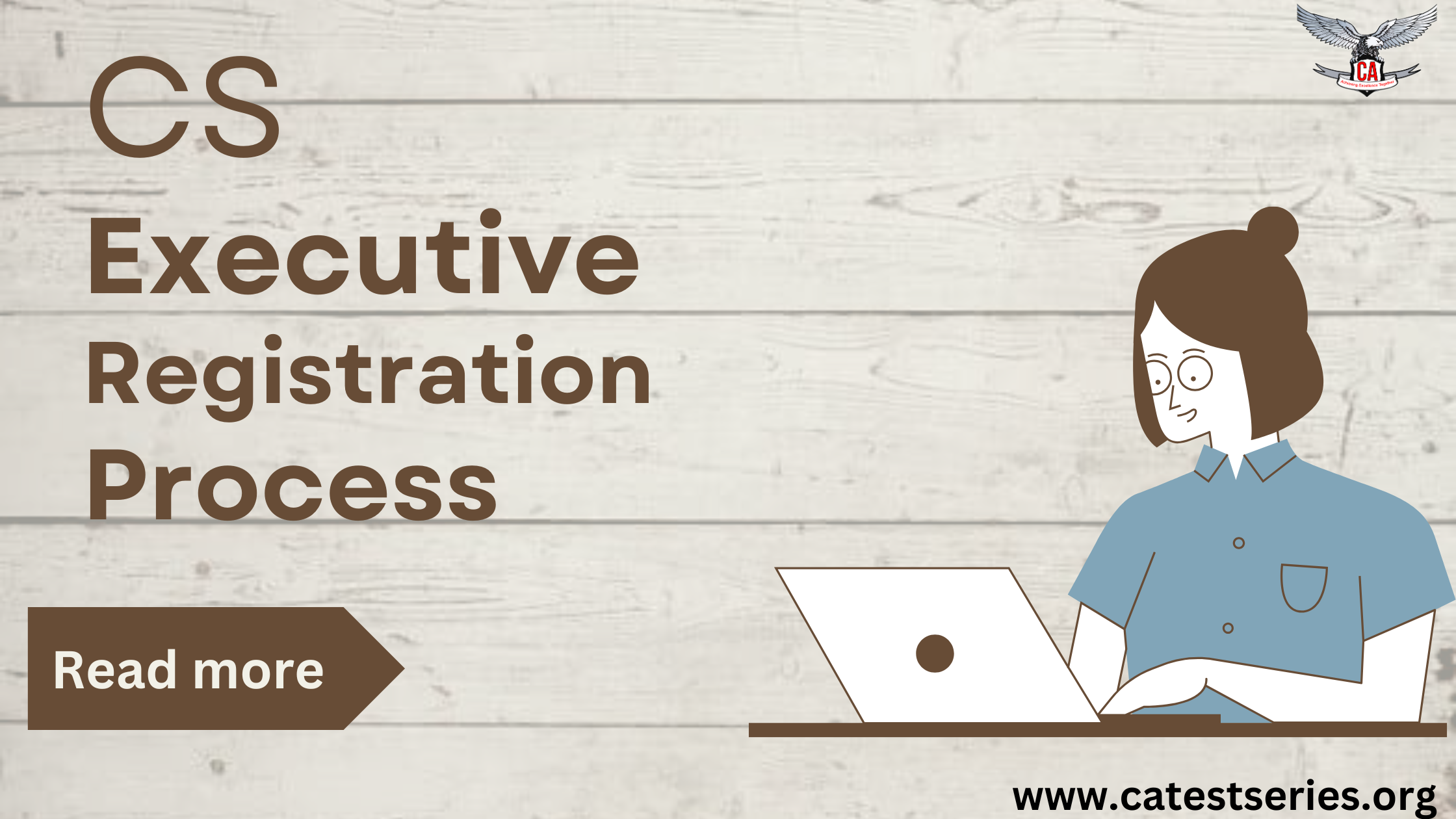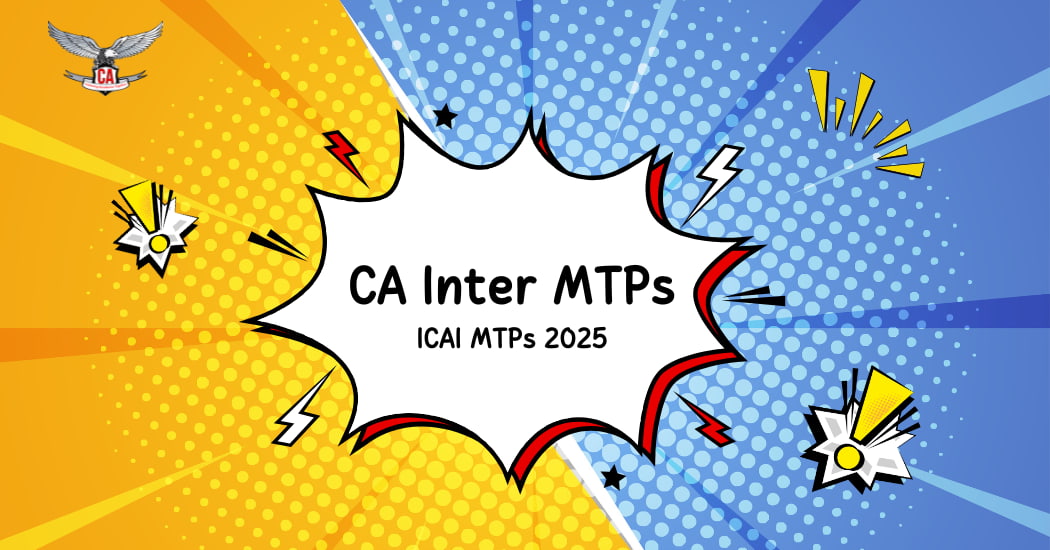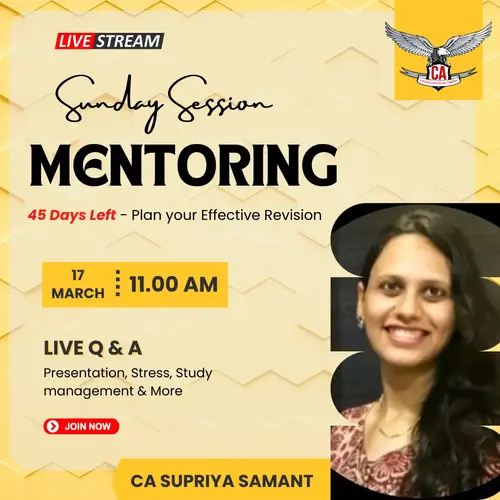CA Inter IPCC Amendments for September 2025 Exams - Summarized Manner
Due to the change in the finance act for May 2021 following amendments need to cover in September 2025 CA Inter Taxation Exam
CA Inter / IPCC Direct Tax Amendments | 20 |
CA Inter / IPCC Indirect Tax Amendments | 7 |
1. Computation of Total Income and Tax Liability
Slab rate and surcharge and HEC remain the same. However, the option has been given under section 115BAC to compute income tax at the rates given below:
If total Income up to Rs2,50,000 | Nil |
On next Rs2,50,000 | 5% |
On next Rs2,50,000 | 10% |
On next Rs2,50,000 | 15% |
On next Rs2,50,000 | 20% |
On next Rs2,50,000 | 25% |
On Balance amount | 30% |
The option has been given only to individuals and HUF to compute tax at the above rates but it is subject to many conditions given under section 115BAC i.e. the assessee has to forgo many of the exemptions and deductions.
In brief, as per section 115BAC, the assessee has to forgo the following exemptions and deductions.
- Section 10(5) – Leave travel concession (LTC)
- Section 10(13A) – House Rent Allowance (HRA)
- Section 10(14) – Special allowances.
- Section 10(32) – Exemption of 1,500 in case of minor children.
- Section 10 AA
- Section 16 (ia),16(ii),16(iii)
- Section 10 (17) – Allowances to MPs and MLAs (Not Covered in syllabus)
- Section 24 (b) in case of property under section 23(2)
- Section 32(1) (iia) – Additional depreciation.
- Section 32AD – Investment allowance in case of notified backward areas.
- Section 33AB – Tea Development account/coffee development account (Not covered in the syllabus)
- Section 33ABA – Site restoration fund (Not covered in the syllabus)
- Section 35 (1) (ii) – Donation to Notified scientific research association (150%)
- Section 35 (1) (iia) – Donation to Indian companies for scientific research (100%)
- Section 35 (1) (iii) – Donation for social science or statistical research (100%)
- Section 35 (2AA) – Donation to National laboratory or Indian Institute of Technology or other notified Institution (150%)
- Section 35AD – Specified business
- Section 35CCC – Agricultural extension project
- Section 57(iia) – Deductions of Family Pension
- Deductions under chapter VIA i.e. 80C to 80U. However Deduction shall be allowed u/s 80CCD (2) & 80JJAA
- Carried forward loss or depreciation relating to the above shall not be allowed and shall lapse.
- Current year loss of house property shall not be set off from any other income and shall lapse.
- Current year depreciation except additional depreciation shall be allowed.
As per section 115BAC (5). An individual and HUF shall exercise their option at the time of filing of return of income but a person having income under business/profession who has opted for this scheme shall be allowed to come out only once and after that, he can never opt for this scheme. If subsequently, such person does not have income under the head business/profession, again such person can exercise such option on year to year basis.
2.Section 80M (Newly Added)
Deduction in respect of certain inter-corporate dividends
If any domestic company has received a dividend from any other domestic company or foreign company or business trust, in such cases deduction shall be allowed to the extent dividend has been distributed by such company to others but it cannot exceed the amount of dividend received but up to the last date of filing of return of income. e.g. ABC limited has received a dividend of 100,00,000 from the domestic company or foreign company or a business trust in P.Y. 2020-21 and it has distributed a dividend of 60,00,000 up to the last date of filing of return of income, the deduction allowed u/s 80M shall be 60,00,000 but if dividend distributed is 150,00,000, the deduction allowed shall be 100,00,000.
3. Capital Gain - Indexation for the Financial year 2020-21 is 301
4. Residential Status - A new section 6(1A) has been inserted. If any person is non - resident as per section 6(1), in that case, 6(1A) shall be applied to such person to check whether he is resident. The new provision is as given below:
Section 69(1A) - Notwithstanding anything contained in clause (1), an individual, being a citizen of India, having a total income, other than the income from foreign sources, exceeding fifteen lakh rupees during the previous year shall be deemed to be resident in India in that previous year, if he is not liable to tax in any other country or territory by reason of his domicile or residence or any other criteria of similar nature.
Explanation.—For the removal of doubts, it is hereby declared that this clause shall not apply in the case of an individual who is said to be resident in India in the previous year under clause (1).
If any person is covered in a special category and is settled outside India and comes to India on a visit for a maximum of 181 days, he will be a non-resident. Now some more part has been added as given below:
In case of the citizen or person of Indian origin having a total income, other than the income from foreign sources, exceeding fifteen lakh rupees during the previous year, he will be considered to be resident if his stay during the year is 120 days or more but maximum 181 days and also his stay during 4 years preceding the relevant previous year is 365 days or more. Further as per section 6(6)(c) he will be considered to be NOR. If the stay is 182 days or more in the current year, he is resident and ROR/NOR shall be decided as per section 6(6)(a).
Business connection - There will be a business connection in the following cases also:
Explanation 3A - Business connection shall include income from—
- such advertisement which targets a customer who resides in India or a customer who accesses the advertisement through an internet protocol address located in India;
- sale of data collected from a person who resides in India or from a person who uses an internet protocol address located in India; and
- sale of goods or services using data collected from a person who resides in India or from a person who uses an internet protocol address located in India.
The concept of Significant economic presence shall not be applicable in the P.Y. 2020-21 rather it will be applicable from P.Y. 2021-22.
Deductions from GTI
5. Section 80EEA - The earlier loan was required to be sanctioned from 01.04.19 to 31.03.2020 but now it has been extended up to 31.03.2021.
6. Section 80G - Deduction shall be allowed up to 100% of donation given to PM CARES Fund.
7. Section 80GGA - Donations in excess of Rs10,000 should be given otherwise than in cash but now Rs10,000 has been changed to Rs2,000.
8. Earlier surcharge was applicable maximum @ 15% on short term 111A and Long term 112A but now dividend income has also been included and surcharge applicable shall be maximum @ 15%.
Dividend Income - Further sections 10(34),10(35),115O, and 115R have been deleted and now dividend and interest income shall be taxable in the hands of the recipient. Also, section 115BBDA has been deleted.
As per section 57, if any person has incurred any expense in earning dividend or income from a mutual fund, such expenses shall not be allowed while computing income however any interest paid shall be allowed to be deducted a maximum of up to 20% of Dividend income or interest income. E.g. Mr. X has taken a loan of Rs10,00,000 and paid interest 1,00,000 and invested the amount in shares and received a dividend of Rs2,00,000, in this case, interest allowed to be deducted shall be Rs40,000 and balance Rs1,60,000 shall be taxable.
Dividend received u/s 22(a)/22 (b)/22 (c)/22 (d)/22 (e) shall now be taxable in the hands of recipient.
9. TDS (Section 194) - Dividends
The principal officer of an Indian company or a company which has made the prescribed arrangements for the declaration and payment of dividends (including dividends on preference shares) within India, shall, before making any payment [by any mode] in respect of any dividend or before making any distribution or payment to a shareholder, [who is resident in India,] of any dividend within the meaning of sub-clause (a) or sub-clause (b) of sub-clause (c) or sub-clause (d) or sub-clause (e) of clause (22) of section 2, deduct from the amount of such dividend, income-tax [at the rate of ten percent] :
[Provided that no such deduction shall be made in the case of a shareholder, being an individual, if—
- the dividend is paid by the company by [any mode other than cash]; and
- the amount of such dividend or, as the case may be, the aggregate of the amounts of such dividend distributed or paid or likely to be distributed or paid during the financial year by the company to the shareholder, does not exceed [five thousand] rupees:
Provided further that the provisions of this section shall not apply to such income credited or paid to—
- the Life Insurance Corporation of India established under the Life Insurance Corporation Act, 1956, in respect of any shares owned by it or in which it has a full beneficial interest;
- the General Insurance Corporation of India (hereafter in this proviso referred to as the Corporation) or to any of the four companies (hereafter in this proviso referred to as such company), formed by virtue of the schemes framed under sub-section (1) of section 16 of the General Insurance Business (Nationalisation) Act, 1972, in respect of any shares owned by the Corporation or such company or in which the Corporation or such company has a full beneficial interest;
- any other insurer in respect of any shares owned by it or in which it has a full beneficial interest.]
Earlier in some of the sections it was mentioned that in the case of individual and HUF if the audit was required in the earlier year, the tax was to be deducted but now instead of audit turnover has been mentioned 100 lakhs in case of business and 50 lakhs in case of the profession.
10. Section 194J - Earlier TDS @ 10% on technical fees or royalty is required to be deducted u/s 194J but now 2% is required to be deducted on technical fee or royalty.
11. Section 194K - Any mutual fund or other specified companies responsible for paying income in connection with units shall deduct tax at source @ 10% provided the amount paid or payable to a particular person during a particular year is exceeding 5,000.
12. Section 194O (New Section introduced)
Every e-commerce operator while making payment to any e-commerce participants shall deduct tax at source @ 1% of the gross amount of sales or services. Further, no tax shall be deducted at source if the amount credited or paid or likely to be credited or paid during the previous year to any e-commerce participants do not exceed 5,00,000 provided such e-commerce participants is individual or HUF.
13. Section 194N (Substitution of Section) - Payment of certain amounts in cash. 194N.
1. Every person, being,—
- a banking company to which the Banking Regulation Act, 1949 (10 of 1949) applies (including any bank or banking institution referred to in section 51 of that Act);
- a co-operative society engaged in carrying on the business of banking; or
- a post office,
who is responsible for paying any sum, being the amount or the aggregate of amounts, as the case may be, in cash exceeding one crore rupees during the previous year, to any person (herein referred to as the recipient) from one or more accounts maintained by the recipient with it shall, at the time of payment of such sum, deduct an amount equal to two percent of such sum, as income-tax:
2. Provided that in case of a recipient who has not filed the returns of income for all of the three assessment years relevant to the three previous years, for which the time limit of file return of income under sub-section (1) of section 139 has expired, immediately preceding the previous year in which the payment of the sum is made to him, the provision of this section shall apply with the modification that-
- the sum shall be the amount or the aggregate of amounts, as the case may be, in cash exceeding twenty lakh rupees during the previous year; and
- the deduction shall be—
- an amount equal to two percent of the sum where the amount or aggregate of amounts, as the case may be, being paid in cash exceeds twenty lakh rupees during the previous year but does not exceed one crore rupees; or
- an amount equal to five percent of the sum where the amount or aggregate of amounts, as the case may be, being paid in cash exceeds one crore rupees during the previous year:
3. Provided further that the Central Government may specify in consultation with the Reserve Bank of India, by notification in the Official Gazette, the recipient in whose case the first proviso shall not apply or apply at a reduced rate if such recipient satisfies the conditions specified in such notification:
4. Provided also that nothing contained in this section shall apply to any payment made to—
- the Government;
- any banking company or a co-operative society engaged in carrying on the business of banking or a post office;
- any business correspondent of a banking company or co-operative society engaged in carrying on the business of banking, in accordance with the guidelines issued in this regard by the Reserve Bank of India under the Reserve Bank of India Act, 1934;
- any white label automated teller machine operator of a banking company or co-operative society engaged in carrying on the business of banking, in accordance with the authorization issued by the Reserve Bank of India under the Payment and Settlement Systems Act, 2007):
5. Provided also that the Central Government may specify in consultation with the Reserve Bank of India, by notification in the Official Gazette, the recipient in whose case the provision of this section shall not apply or apply at a reduced rate if such recipient satisfies the conditions specified in such notification.
14. Section 206AA - Where TDS is required to be deducted u/s 194O and PAN has not been provided then TDS @ 5% shall be required to be deducted (instead of 20%)
15. Section 139 (1) – Return of income
- Earlier only working partners of a firm whose accounts are required to be audited shall be required to file a return of income on or before 30th September but now all the partners are required to file on or before 31st October.
- Earlier for companies and any person (other than a company) required to get his books of accounts audited are required to file a return before 30th September but now the same has been extended and required to be filed on or before 31st October.
16. Taxability of Gift - If Stamp duty value is exceeding actual sales consideration up to 5% of actual sales consideration, actual sales consideration was considered but now 5% has been amended as 10% and the same amendment has been done in section 50C and section 43CA. Eg. If land and building sold for 100,00,000 but the stamp duty value is 110,00,000, there is no gift.
17. Section 55(2) – Cost of Acquisition
If the asset is acquired before 01-04-2001, the cost of acquisition shall be the cost price or fair market value on 01- 04-2001 whichever is higher however it is now amended in case of land or building, such fair market value cannot exceed stamp duty value as on 01.04.2001
18. Business / Profession - Compulsory Audit Section 44AB
Audit of accounts of certain persons carrying on business or profession.
Every person,—
- carrying on business shall, if his total sales, turnover or gross receipts, as the case may be, in business exceed or exceeds [one crore rupees] in any previous year:
Provided that in the case of a person whose—
- the aggregate of all amounts received including the amount received for sales, turnover or gross receipts during the previous year, in cash, does not exceed five percent of the said amount; and
- the aggregate of all payments made including the amount incurred for expenditure, in cash, during the previous year does not exceed five percent of the said payment,
this clause shall have effect as if for the words "one crore rupees", the words "five crore rupees" had been substituted; or
- carrying on profession shall if his gross receipts in profession exceed [fifty] lakh rupees] in any [previous year; or
- carrying on the business shall if the profits and gains from the business are deemed to be the profits and gains of such person under [section 44AE ] [or section 44BB or section 44BBB], as the case may be, and he has claimed his income to be lower than the profits or gains so deemed to be the profits and gains of his business, as the case may be, in any [previous year; or]
[(d) carrying on the [profession] shall if the profits and gains from the [profession] are deemed to be the profits and gains of such person under [section 44ADA] and he has claimed such income to be lower than the profits and gains so deemed to be the profits and gains of his [profession] and his income exceeds the maximum amount which is not chargeable to income-tax in any [previous year; or]]
[(e) carrying on the business shall if the provisions of sub-section (4) of section 44AD are applicable in his case and his income exceeds the maximum amount which is not chargeable to income-tax in any previous year,]
get his accounts of such previous year audited by an accountant before the specified date and [furnish by] that date the report of such audit in the prescribed form duly signed and verified by such accountant and setting forth such particulars as may be prescribed:
Provided that this section shall not apply to the person, who declares profits and gains for the previous year in accordance with the provisions of sub-section (1) of section 44AD and his total sales, turnover, or gross receipts, as the case may be, in business does not exceed two crore rupees in such previous year
Provided further that this section shall not apply to the person, who derives income of nature referred to in section 44B or section 44BBA, on and from the 1st day of April 1985 or, as the case may be, the date on which the relevant section came into force, whichever is later
Provided also that in a case where such person is required by or under any other law to get his accounts audited, it shall be sufficient compliance with the provisions of this section if such person gets the accounts of such business or profession audited under such law before the specified date and [furnishes by] that date the report of the audit as required under such other law and a further report [by an accountant] in the form prescribed under this section.
Explanation.—For the purposes of this section,—
(i) "accountant" shall have the same meaning as in the Explanation below sub-section (2) of section 288;
[(ii) "specified date", in relation to the accounts of the assessee of the previous year relevant to an assessment year, means [date one month prior to] [the due date for furnishing the return of income under sub-section (1) of section 139].]]
19.. Salary - Section 17(2)(vii)/(via)
The amount or the aggregate of amounts of any contribution made to the account of the assessee by the employer—
- in a recognized provident fund;
- in the scheme referred to in sub-section (1) of section 80CCD, and (c)in an approved superannuation fund,
to the extent, it exceeds seven lakh and fifty thousand rupees in a previous year;
20. section 17(2) (viia), the annual accretion by way of interest, dividend, or any other amount of similar nature during the previous year to the balance at the credit of the fund or scheme referred to in sub-clause (vii) to the extent it relates to the contribution referred to in the said sub-clause which is included in total income under the said sub-clause in any previous year computed in such manner as may be prescribed;
CA Inter / IPCC Indirect Tax Amendments for September 2025 Exams
1. ITC - If any debit note has been issued in connection with an invoice, the date of the debit note shall be taken into consideration for the purpose of determining the time limit and not the date of invoice, eg. Invoice is issued on 10/01/2021 and debit note is issued on 20/04/2021, in this case, ITC can be taken maximum up to 20/10/2022 or the date of filing annual return whichever is earlier.
2. GSTR -1 - The registered persons having aggregate turnover of up to 1.5 crore rupees in the preceding financial year or the current financial year, as the class of registered persons shall furnish the details of outward supply of goods or services or both in FORM GSTR-1 for every quarter under proviso to sub-section (1) of section 39 of the said Act, shall be extended till the thirteenth day of the month succeeding such tax period.
3. Returns - Rule 67A. Manner of furnishing of return or details of outward supplies by short messaging service facility.—Notwithstanding anything contained in this Chapter, for a registered person who is required to furnish a Nil return under section 39 in FORM GSTR-3B or a Nil details of outward supplies under section 37 in FORM GSTR-1 or a Nil statement in FORM GST CMP-08 for a tax period, any reference to electronic furnishing shall include the furnishing of the said return or the details of outward supplies or statement through a short messaging service using the registered mobile number and the said return or the details of outward supplies or statement shall be verified by a registered mobile number based One Time Password facility.
Explanation.—For the purpose of this rule, a Nil return or Nil details of outward supplies or Nil statement shall mean a return under section 39 or details of outward supplies under section 37 or statement under rule 62, for a tax period that has nil or no entry in all the Tables in FORM GSTR-3B or forms GSTR- 1 or FORM GST CMP-08, as the case may be.
4. Tax Invoice - Rule 46
In rule 46, after clause (q), the following clause shall be inserted, namely:—
(r) Quick Response code, having embedded Invoice Reference Number (IRN) in it, in case invoice has been issued in the manner prescribed under sub-rule (4) of rule 48
Rule 138A (2), the following sub-rule shall be substituted, namely: In case, the invoice is issued in the manner prescribed under sub-rule (4) of rule 48, the Quick Response (QR) code having an embedded Invoice Reference Number (IRN) in it, maybe produced electronically, for verification by the proper officer in lieu of the physical copy of such tax invoice
5. Payment of GST - Interest on delayed payment of tax Section 50.
(1) Every person who is liable to pay tax in accordance with the provisions of this Act or the rules made
thereunder, but fails to pay the tax or any part thereof to the Government within the period prescribed, shall for the period for which the tax or any part thereof remains unpaid, pay, on his own, interest at such rate, not exceeding eighteen percent, as may be notified by the Government on the recommendations of the Council:
Provided that the interest on tax payable in respect of supplies made during a tax period and declared in
the return for the said period furnished after the due date in accordance with the provisions of section 39, except where such return is furnished after commencement of any proceedings under section 73 or section 74 in respect of the said period, shall be levied on that portion of the tax that is paid by debiting the electronic cash ledger. (applicable w.e.f. 01.09.2020)
(2) The interest under sub-section (1) shall be calculated, in such manner as may be prescribed, from the day succeeding the day on which such tax was due to be paid.
(3) A taxable person who makes an undue or excess claim of input tax credit under sub-section (10) of section 42 or undue or excess reduction in output tax liability under sub-section (10) of section 43, shall pay interest on such undue or excess claim or on such undue or excess reduction, as the case may be, at such rate not exceeding twenty-four percent, as may be notified by the Government on the recommendations of the Council.
6. Exemption - Satellite launch services supplied by Indian Space Research Organisation, Antrix Corporation Limited, or New Space India Limited shall be exempted.
7. Notification number 78/2020 CT dated 15-10-2020
In exercise of the powers conferred by the first proviso to rule 46 of the Central Goods and Services Tax Rules, 2017, the Central Board of Indirect Taxes and Customs, on the recommendations of the Council, hereby makes the following amendment in the notification of the Government of India in the Ministry of Finance (Department of Revenue), No. 12/2017 - Central Tax, dated the 28th June 2017, published in the Gazette of India, Extraordinary, Part II, Section 3, Sub-section (i) vide number G.S.R. 660(E), dated the 28th June 2017, namely:—
In the said notification, with effect from the 01st day of April 2021, for the Table, the following shall be substituted, namely-
Sl. No. | Aggregate Turnover in the preceding Financial Year | Number of Digits of Harmonised System of Nomenclature Code (HSN Code) |
|---|---|---|
(1) | (2) | (3) |
1. | Up to rupees five crores | 4 |
2. | more than rupees five crores | 6 |
Also Check:
Provided that a registered person having aggregate turnover up to five crores rupees in the previous financial year may not mention the number of digits of HSN Code, as specified in the corresponding entry in column (3) of the said Table in a tax invoice issued by him under the said rules in respect of supplies made to unregistered persons.

